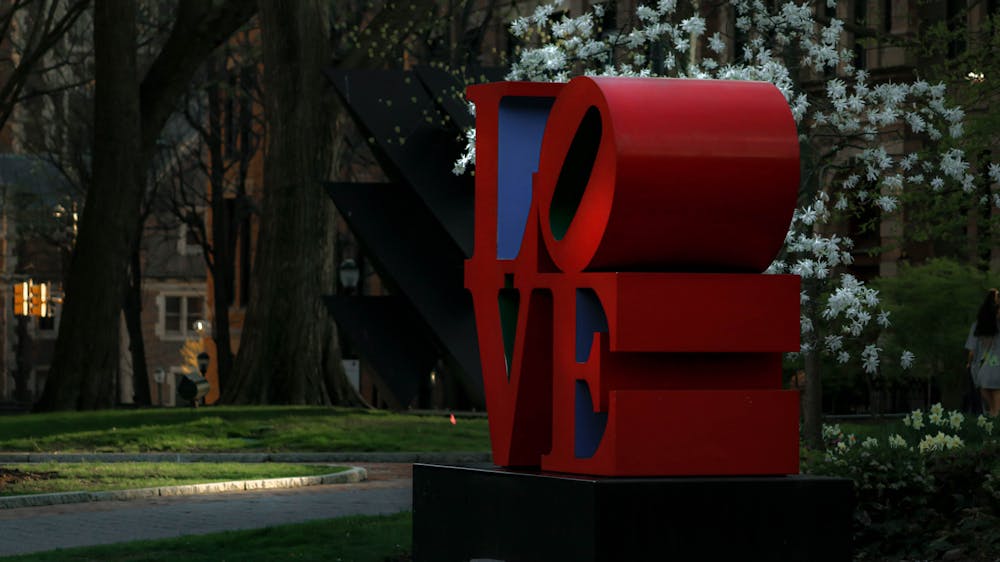
Hookup culture is reported to dominate every college campus. Penn is no exception. In fact, Penn apparently is the rule. As the “Social Ivy,” Penn’s nickname transcends into its romantic culture: everyone is being social, with everyone.
The report on Penn’s campus is clear: dating doesn’t exist. Hooking up is the most prevalent way to explore partners. It infects campus in every corner, from nights out to morning debriefs. The phrase “hooking up” might as well be in our motto. Imagine: Hookups without morals are useless.
Students don’t go on dates, instead they have “situationships” and hookups. Both terms distinguish a partnership that is romantic or sexual without the commitment and effort that define typical relationships. They’re rarely seen in the daylight and are most often found in the corners of fraternity parties, or at the end of late-night treks across campus after receiving a “you up?” text. Many critiques on hookup culture are valid. It’s impossible to deny that casual romantic partnerships can pose difficult social and emotional consequences. However, the criticism that this culture ruins romance and destroys the chance for students to form meaningful romantic connections is false.
As I arrived on campus, I expected most students to express their desire for this casual romance. Yet, professors ask us to take a look to our left; our future spouse might be there! Friends joke that their parents would be so happy with their choice of a DFMO partner. Others gush that their situationship was from a nearby hometown or pursuing the major they would want in a spouse. I’ve even heard students use the phrase "ring by spring,” or mention signing up for Penn’s Marriage Pact. Most recently, well over 4,000 Penn students have signed up. This is nearly half of Penn’s undergraduate population.
Experiencing all of this clearly challenges the narrative presented by the media that hookup culture is counterproductive to securing a life-long partner. In fact, it appeared that amidst hookup culture, the marriage mindset was thriving at Penn!
I surveyed 47 students on their romantic habits, and the results posed big questions about the portrayal of hookup culture at Penn. The students reported that dating was not a big focus for them, however, they hoped to get married to a partner they found at Penn. They actively participate in hookup culture, while simultaneously searching for their forever. They are not mutually exclusive; both can be true at once, and they are.
This seems like a paradoxical approach, but as you evaluate the time-optimizing attitude that permeates Penn students, it makes sense. With a school so focused on preprofessional education, students see time and money as the only resources that matter. It feels inefficient to waste time on long-term monogamous relationships when, as one surveyed student confided, “no one even has time to think a spare thought much less date.”
The majority of students surveyed admitted to (consciously or subconsciously) seeking out hookup partners based on certain qualities they wanted in a long-term partner such as future career, class, race/ethnicity, and hometown. This demonstrates that, in many ways, Penn students are approaching romance the same way they do with college and their career: efficient, but with purpose. Hooking up might appear casual on the surface, but beneath this, there is an intentionality that seems more similar to being in a serious relationship.
The picture painted of Penn’s hookup culture as detrimental to marriage fails to consider the nuanced reality of student relationships. The narrative presents hookups as the antithesis to long-term romance, yet my understanding produces a more complex image. Students don’t exclusively participate in casual relationships for transactional pleasure: they also do so to explore the qualities they want in a future partner. At Penn, hooking up and searching for your forever can be two sides of the same coin.
Without negating the rampant existence of hookup culture at Penn, it’s important to acknowledge that the discourse is often a generalization based on a limited sample. As students commenting on and navigating through Penn’s romantic landscape, it’s important that we, too, recognize the complexities.
Engaging in hookup culture doesn’t mean students are heartless, or not in the search of meaningful companionship. Hooking up doesn’t have to kill romance. Love is a phoenix, it can rise from whatever ashes it’s given. Who are we to decide what those ashes have to look like?
PIPER SLINKA-PETKA is a College first year studying health and societies from West Virginia. Her email address is pipersp@sas.upenn.edu.
The Daily Pennsylvanian is an independent, student-run newspaper. Please consider making a donation to support the coverage that shapes the University. Your generosity ensures a future of strong journalism at Penn.
Donate







